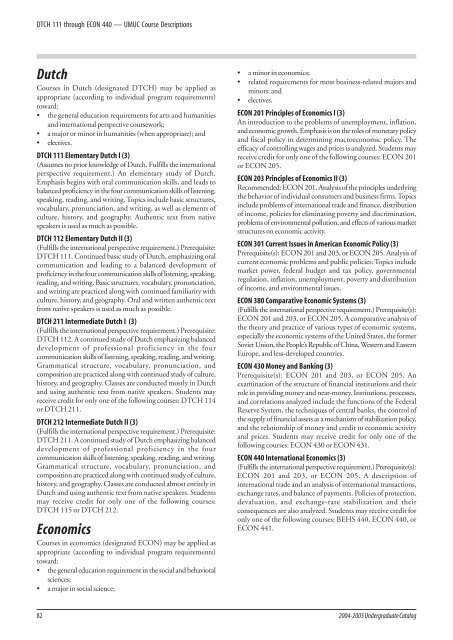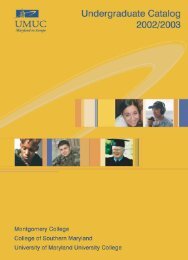Statements of Policy - UMUC Europe
Statements of Policy - UMUC Europe
Statements of Policy - UMUC Europe
You also want an ePaper? Increase the reach of your titles
YUMPU automatically turns print PDFs into web optimized ePapers that Google loves.
DTCH 111 through ECON 440 — <strong>UMUC</strong> Course Descriptions<br />
Dutch<br />
Courses in Dutch (designated DTCH) may be applied as<br />
appropriate (according to individual program requirements)<br />
toward:<br />
• the general education requirements for arts and humanities<br />
and international perspective coursework;<br />
• a major or minor in humanities (when appropriate); and<br />
• electives.<br />
DTCH 111 Elementary Dutch I (3)<br />
(Assumes no prior knowledge <strong>of</strong> Dutch. Fulfills the international<br />
perspective requirement.) An elementary study <strong>of</strong> Dutch.<br />
Emphasis begins with oral communication skills, and leads to<br />
balanced pr<strong>of</strong>iciency in the four communication skills <strong>of</strong> listening,<br />
speaking, reading, and writing. Topics include basic structures,<br />
vocabulary, pronunciation, and writing, as well as elements <strong>of</strong><br />
culture, history, and geography. Authentic text from native<br />
speakers is used as much as possible.<br />
DTCH 112 Elementary Dutch II (3)<br />
(Fulfills the international perspective requirement.) Prerequisite:<br />
DTCH 111. Continued basic study <strong>of</strong> Dutch, emphasizing oral<br />
communication and leading to a balanced development <strong>of</strong><br />
pr<strong>of</strong>iciency in the four communication skills <strong>of</strong> listening, speaking,<br />
reading, and writing. Basic structures, vocabulary, pronunciation,<br />
and writing are practiced along with continued familiarity with<br />
culture, history, and geography. Oral and written authentic text<br />
from native speakers is used as much as possible.<br />
DTCH 211 Intermediate Dutch I (3)<br />
(Fulfills the international perspective requirement.) Prerequisite:<br />
DTCH 112. A continued study <strong>of</strong> Dutch emphasizing balanced<br />
development <strong>of</strong> pr<strong>of</strong>essional pr<strong>of</strong>iciency in the four<br />
communication skills <strong>of</strong> listening, speaking, reading, and writing.<br />
Grammatical structure, vocabulary, pronunciation, and<br />
composition are practiced along with continued study <strong>of</strong> culture,<br />
history, and geography. Classes are conducted mostly in Dutch<br />
and using authentic text from native speakers. Students may<br />
receive credit for only one <strong>of</strong> the following courses: DTCH 114<br />
or DTCH 211.<br />
DTCH 212 Intermediate Dutch II (3)<br />
(Fulfills the international perspective requirement.) Prerequisite:<br />
DTCH 211. A continued study <strong>of</strong> Dutch emphasizing balanced<br />
development <strong>of</strong> pr<strong>of</strong>essional pr<strong>of</strong>iciency in the four<br />
communication skills <strong>of</strong> listening, speaking, reading, and writing.<br />
Grammatical structure, vocabulary, pronunciation, and<br />
composition are practiced along with continued study <strong>of</strong> culture,<br />
history, and geography. Classes are conducted almost entirely in<br />
Dutch and using authentic text from native speakers. Students<br />
may receive credit for only one <strong>of</strong> the following courses:<br />
DTCH 115 or DTCH 212.<br />
Economics<br />
Courses in economics (designated ECON) may be applied as<br />
appropriate (according to individual program requirements)<br />
toward:<br />
• the general education requirement in the social and behavioral<br />
sciences;<br />
• a major in social science;<br />
82<br />
• a minor in economics;<br />
• related requirements for most business-related majors and<br />
minors; and<br />
• electives.<br />
ECON 201 Principles <strong>of</strong> Economics I (3)<br />
An introduction to the problems <strong>of</strong> unemployment, inflation,<br />
and economic growth. Emphasis is on the roles <strong>of</strong> monetary policy<br />
and fiscal policy in determining macroeconomic policy. The<br />
efficacy <strong>of</strong> controlling wages and prices is analyzed. Students may<br />
receive credit for only one <strong>of</strong> the following courses: ECON 201<br />
or ECON 205.<br />
ECON 203 Principles <strong>of</strong> Economics II (3)<br />
Recommended: ECON 201. Analysis <strong>of</strong> the principles underlying<br />
the behavior <strong>of</strong> individual consumers and business firms. Topics<br />
include problems <strong>of</strong> international trade and finance, distribution<br />
<strong>of</strong> income, policies for eliminating poverty and discrimination,<br />
problems <strong>of</strong> environmental pollution, and effects <strong>of</strong> various market<br />
structures on economic activity.<br />
ECON 301 Current Issues in American Economic <strong>Policy</strong> (3)<br />
Prerequisite(s): ECON 201 and 203, or ECON 205. Analysis <strong>of</strong><br />
current economic problems and public policies. Topics include<br />
market power, federal budget and tax policy, governmental<br />
regulation, inflation, unemployment, poverty and distribution<br />
<strong>of</strong> income, and environmental issues.<br />
ECON 380 Comparative Economic Systems (3)<br />
(Fulfills the international perspective requirement.) Prerequisite(s):<br />
ECON 201 and 203, or ECON 205. A comparative analysis <strong>of</strong><br />
the theory and practice <strong>of</strong> various types <strong>of</strong> economic systems,<br />
especially the economic systems <strong>of</strong> the United States, the former<br />
Soviet Union, the People’s Republic <strong>of</strong> China, Western and Eastern<br />
<strong>Europe</strong>, and less-developed countries.<br />
ECON 430 Money and Banking (3)<br />
Prerequisite(s): ECON 201 and 203, or ECON 205. An<br />
examination <strong>of</strong> the structure <strong>of</strong> financial institutions and their<br />
role in providing money and near-money. Institutions, processes,<br />
and correlations analyzed include the functions <strong>of</strong> the Federal<br />
Reserve System, the techniques <strong>of</strong> central banks, the control <strong>of</strong><br />
the supply <strong>of</strong> financial assets as a mechanism <strong>of</strong> stabilization policy,<br />
and the relationship <strong>of</strong> money and credit to economic activity<br />
and prices. Students may receive credit for only one <strong>of</strong> the<br />
following courses: ECON 430 or ECON 431.<br />
ECON 440 International Economics (3)<br />
(Fulfills the international perspective requirement.) Prerequisite(s):<br />
ECON 201 and 203, or ECON 205. A description <strong>of</strong><br />
international trade and an analysis <strong>of</strong> international transactions,<br />
exchange rates, and balance <strong>of</strong> payments. Policies <strong>of</strong> protection,<br />
devaluation, and exchange-rate stabilization and their<br />
consequences are also analyzed. Students may receive credit for<br />
only one <strong>of</strong> the following courses: BEHS 440, ECON 440, or<br />
ECON 441.<br />
2004-2005 Undergraduate Catalog






